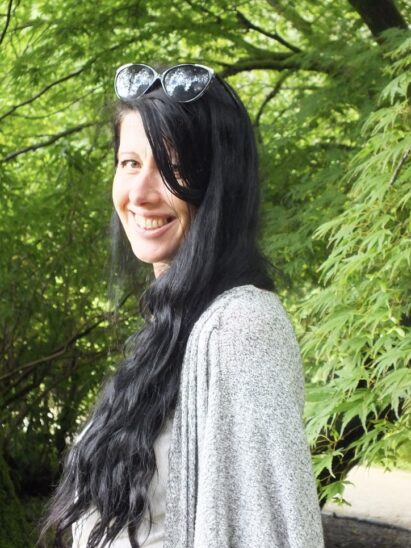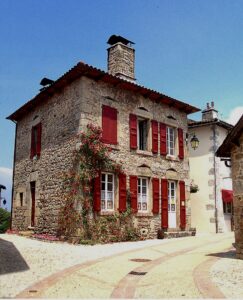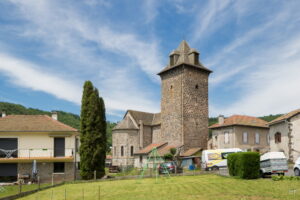September 2021: Fiona Blundell CNF (Fall 2021)

Fiona Blundell is English by birth, French by choice and lives in Massachusetts. Writer, storyteller, dreamer, she is currently working on a novel ‘Low Burns The Candle’ which she will submit as her MFAW thesis at Goddard. Most mornings, she pinches herself to ensure this is not one of her fabled fantasies. It turns out it isn’t.
Pitkin: Tell us a little about the inspiration for your creative non-fiction work ‘The Cast Off’
FB: Sure. I moved to France in 2013 and bought a house in a tiny village in the south in one of the least populated places in western Europe where cows outnumber humans by a factor of 3-1.
Although it now only has 500 inhabitants, the commune was once a thriving city of thousands and the house we bought was its first building, around which everything else that now forms ‘the smallest city in France’ was built. The walls in the cellar are 8’ thick to support the five storey stone. I got to know the locals and chatted over coffees and Pastis and plates of Buriole and Pounti in the local bar and gradually formed a picture of the history of the house. That the tower was partially destroyed in the Revolution of 1789 was unsurprising since it represented not only church but feudalism, entwined as they were, and symbolising all that this brave new France abhorred. Twenty-five years later, what remained was fashioned, somewhat ironically, into the building we now see as a hospice for nuns who nursed their own from the nearby abbey and tended to the locals.
The story which stood out to me, that niggled and demanded I gave it air, was the story of the daughter of the laird of the same family that built the original tower who was sent to be a governess in Russia in the early twentieth century and who fled Moscow in the revolution back to her home, the small chateau that presides over the edge of the community. As I pondered her, I realised that her journey, through war-torn Europe must have been horrifying and perilous. But what struck me hardest was the fact that when she arrived back she was clearly not welcome. She was given the now empty hospice to live in rather than share the familial home. And from her return in 1918 until her death in 1960 (the year of my birth) she only wore Russian clothes with high toque hats and sweeping coats and refused to speak French, often chastising the village children in guttural Russian – some are still alive and remember it well. So she had clearly found a happiness in Russia that was not achieved in her home. Was it love?
I pieced what I could together and made up the rest. I wanted this woman who was an embarrassment to her own family, a nuisance and who I was repeatedly told was very tall, as I am, to have a story. I guess that’s the creative part of the creative non-fiction.
My intention is to turn this into a novella that forms part of a bigger work focusing on the women who preceded me in this house named ‘La Maison Carrée’ (or La Maison Catastrophe as it presently is).
This is the house:

And this, in a nearby village and a rare example of an intact watchtower is pretty much identical to the way she would have been pre-decapitation in the revolution:

Pitkin: Thank you, Fiona.
‘The Cast-Off’ – Fiona Blundell
Her name was Virginie des Poux. She was born in the last decade of the nineteenth century in a tiny village in Southern France. And once she was born she grew and she grew and she grew. Willowy, lithe limbed, she was everything a woman was not meant to be. Not curvaceous, pert and petite, not the bosomy, buxom form favoured then, rather she was flat and long, her hands and feet large, though at least the latter could be concealed once she was old enough to wear her skirts to the floor. If she had been born one hundred years later, she would have been beautiful with her graceful swan neck and sculpted angular features, but in a place where a tall man stands a metre seventy-five, she was a galumphing giantess. She despised her reflection. Her flaming hair, her ivory skin, her ashy-lashed whisper gray eyes. No-one could imagine where she came from. Some even speculated that she was a foundling. Perhaps if her privileged family had pondered their history they might have realised she was a viking. After all, France was invaded by the Norse on several of their ruinous pillaging sprees. She was a lovely throwback to a time long forgotten. But in her here and now she was simply an oddity.
Her mother wrung her hands, her father scratched his head. Not one of their suitable suitors fell for her unusual charms and when she turned twenty years old, her despondent papa could stand it no more. He arranged to have her sent to Moscow. To be the governess to a family of eye-watering wealth. French was the first language of noblemen in Russia at the time and a French governess was a desirable accoutrement that pointed to the covetable status of a family.
And she loved it. And she found love. An officer in The Tzar’s army came to a ball at the family summer palace: a place that covers more than a square kilometre of land and was only used for four months of the year. The fountains were unwrapped from their burlap bandages, and the water turned on to sparkle and dance gleefully in the sunlight. She and her secret lover walked hand in hand amongst them. She admired his fine moustache, he adored her languid grace. They read to one another, in French and in Russian. She had learned the language easily as though this was the place she was meant to be. Life beckoned enticingly and though she knew she would have to wait years for her love to be free of his commission, free to marry her, she was unafraid.
1914, war in Europe. Her beau is sent to fight. They correspond, she daily, never leaving a single tiny detail out of her beautifully scripted notes, he more sporadically but she knows his heart, she knows he loves her, knows he will return.
Years pass. 1917. Blood. Chaos. Revolution. The army is stretched between holding back the enemy on the eastern front and overcoming the enemy on the streets. He comes back to Moscow. He fights. They snatch the merest snippet of a moment together and then. Then. The family must flee. Understand, all of this takes place in a matter of days. The confusion that she feels, the compromise and then the despair when they say. “Go! You are on your own. Go back to France. You cannot stay here. You cannot come with us to London. It is too dangerous for us, we cannot take extras. Go!”
She crams all she can into a bulging, heavy valise, waits for him. He does not come. She leaves a note in the place she knows he will look. And she departs. By train, on foot, by train, on foot, the rhythm. Months pass. She keeps moving. She passes through town after town, country after country, and they have one thing in common. They are rubble. They are ruined, ransacked, ravaged. Man’s inhumanity to man is all around her. She eats when she can eat, has rubles in her purse, has jewellery to sell, has his ring: the one he gave her when they first lay together. His promise. She will keep his promise.
Finally she reaches the village she left those years before. She walks, tall and straight up the long plane-tree lined driveway to the chateau. She knocks on the door. Her brother opens it. His wife, whom she vaguely remembers from that life long ago and far away from the vision of perfection she carries in her heart, is behind him. She falls into his arms, shaken and shocked. He leads her to the parlour. She can hear the hissing wife, “She can’t stay here. I forbid it! Sort something out Henri. Anything! But she is not welcome. She can’t stay here”
Fortunately for Henri, in 1820-something, a forebear had built a hospice out of the decapitated ruins of the five storey stone watchtower that had stood vigilant since 1203, beheaded like so many people of Henri’s privileged class in 1789 and the reign of terror that followed it. It had stood forlornly since the revolution in the middle of the walled city that had grown up around it all those moons before. Some of it stood to first lintel height, some to the base of the third.
So the builders brought stone, filled in the jagged scars and levelled it off at three stories to make a perfectly square house, put on a roof, made the inside habitable, ensured there was a chamber for prayer and Henri’s great, great, great, however many greats grandfather, installed nuns to tend to the sick of the village and the ailing sisters of their priory. And also, doubtless, to ensure his place in heaven, for what God could ignore such magnificent beneficence?
The ancient nuns came to die, the young ones were revived and sent back to resume their postulant life. The people of the parish presented as children with scarlet fever; as labouring women with babies positioned favourably or hopelessly for their debut into daylight; as gored men who had failed to jump fast enough when a raging bull resented his harem being taken for milking, and they came with gouty toes, the result of regularly imbibing quantities of rough red wine.
When war broke out, the nursing nuns, unlike Henri, who managed to avoid the call-up, were sent to the front, for trained nurses were in short supply in that hell of man’s making. Henri avoided but not so his only son, who was systematically dispatched to the front and equally speedily consigned to his maker, in 1916 when the ‘cornflowers’, boys of barely seventeen, were conscripted, rudimentarily trained, and trudged in columns to the particular trench that would end their lives before they had even begun. Henri’s wife never recovered.
So la Maison Carrée was opportunely empty and Virginie was generously gifted it by her brother. Such convenient charity, wouldn’t you agree? She lived out her years in that house. Lying in her bed she dreamed that her beau would find her, come for her. Later she dreamed that they would find one another in heaven. Rejected twice by her own family, an evacuee in her own land, she refused from the day she moved in to ever speak French again. The villagers thought her mad, she didn’t care, the Russian language kept her connected to the time she was happy and to the lover she left behind. She wore her Russian clothes proudly: long sweeping coats of velvet and glossy satin, a richly embroidered toque on her resolutely high-held head. She had carried them all from Moscow, they weighed her down, made her journey even more arduous but she would not leave them. She would wear them til the threads wore out and then she would darn them back to fragile life.
Virginie died in 1960 She lies in the graveyard next to the family that rejected her. No-one tends her grave. But the new owners of la Maison Carrée say that the house sighs when her name is spoken. The oldest building in the village known as the smallest city in France, it has seen war, it has seen peace, it has seen legions of sick people pass to their graves, but none, perhaps have pierced its stone heart, the walls in the cellars eight feet thick, so thoroughly as the broken hearted girl, called ugly, called freak by her family but loved by a stranger in foreign land, who never gave up longing for him and who died a refugee in the village she was born in.
Ride on Virginie, I hope you and your love have reunited, to speak Russian together, occasionally French; to read to one another; to dance dans le ciel.